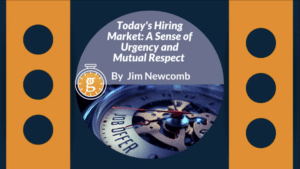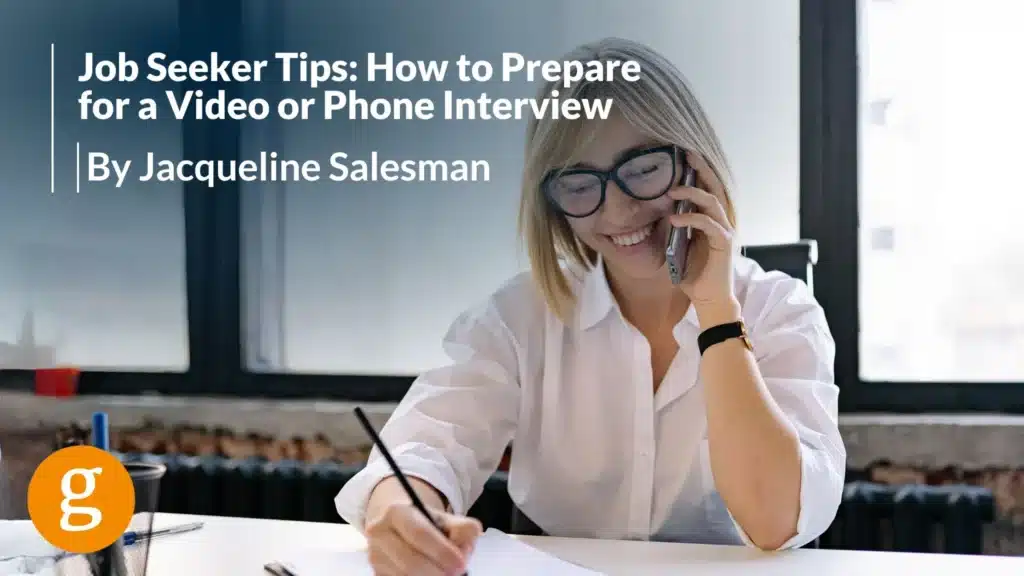Today’s Hiring Market: A Sense of Urgency and Mutual Respect
Jim Newcomb | Career Tips, Hiring Advice, Opinion | January 18, 2022

If you’re a recruiter or hiring manager, you know the hiring market has changed. You can sense the heightened pressure to find and secure your candidate of choice. Perhaps you’ve even missed out on people you wanted to hire because another company acted with more of a sense of urgency. If you’re a job seeker on the other side of the hiring equation, you’ve likely noticed companies moving faster with their hiring needs, and as a candidate, you need to be prepared to move quickly as well.
A Sense of Urgency
There was a time when a sense of urgency in staffing wasn’t as important. No matter how many steps there were in the process or how long they took to fill an open position, candidates would wait. There was good in this, and also bad. On the upside, companies with full-time or part-time positions to fill had their pick of candidates, and they really could take their time to decide. In some cases, though, this luxury of time was taken further. Some companies began treating candidates – their time and their share of the decision – with very little respect. Not maliciously, of course; that was just an outcome of the power imbalance. Companies that treat candidates that way in today’s market will not be successful in hiring top talent.
This does not suggest that decisions in the hiring process should be rushed or hasty. Hiring someone with the right skill set is a critical decision for any company and for the prospective employee – the job description, salary search details, and qualifications must be a match all around. It simply means that smart companies don’t delay or slow the process unnecessarily.
Efficiency in the Process
It begins with a hiring process and strategy designed to be as efficient as possible. Who really needs to be involved, and who doesn’t? Can you hold panel interviews rather than separate interviews and follow-ups with several people? If that’s not the best situation, can you schedule successive interviews over a single block of time, so the candidate only makes one trip? Could more convenient virtual ones replace some in-person interviews?
Transparency
Once the hiring process is defined, outline that process for the people you expect to progress further. When unforeseen changes happen with the job search (as they often do), let candidates know as promptly as you can. In my experience, most people are willing to accommodate any reasonable number of steps and length of time in a hiring process; they just want to know what those steps are. You have everything to gain by being transparent.
Mutual Respect
As a candidate at this stage in the process, you can show initiative, self-motivation, and reciprocal respect by being as responsive and flexible as possible. Quick replies and follow-up about your availability and a genuine effort to accommodate the times suggested make it much easier for the person given the task of putting all these moving pieces in place. On behalf of all recruiters and hiring managers, we thank you.
As an employer, when a decision has been made to offer someone the position, show a sense of urgency and make the offer. That sounds obvious, but a surprising number of companies drag their heels at this stage. Usually, this is because it hasn’t been clearly defined who is ultimately responsible for making the decision, what the criteria are for a ‘yes,’ and who makes the offer, and in what format. Those are important factors to clarify when you’re designing your hiring process.
If you’re reading this from a candidate’s perspective, this is another moment to show a hiring company the same respect they’re showing you. The interview process is a two-way street; you have just as much opportunity and responsibility to check in and assess the fit as does the company. When an offer is made, you should be ready to make your decision within a reasonable amount of time. The quicker you respond – from the initial job posting throughout the entire interview process – the stronger the relationship will be moving forward.
The Check-In
One closing note: there is a window of opportunity between the acceptance of an offer and the start date, and that opportunity is often overlooked. Clearly, a hiring company should respect their new employee’s time commitment to their soon-to-be-former employer during a working notice period. But a simple check-in once or twice during this time can pay dividends. It’s an opportunity to begin the onboarding process for the new job. Extend a friendly welcome, let the qualified candidate know that the company and their team are looking forward to having them as part of the team. Anticipate some of the new employee’s questions about their first day and answer those questions to lessen any first-day jitters and keep anticipation high.
The days when companies held all the cards in the recruitment process are gone (at least for now). Companies that are streamlined and transparent in selecting and hiring new employees will win the most qualified candidates. Embrace the opportunity to make your hiring process as efficient – and as mutually respectful – as it can be.
Enhancing Clients’ Businesses and Changing Candidates’ Lives
If you are seeking a professional partner to assist you with your job search or are looking to link arms with an award-winning recruiting firm to help you in your quest to hire top talent, reach out to Goodwin Recruiting today.
Related Blogs by Jim Newcomb:
Efficient Hiring: How to Make Your Recruiting Partnerships Work for You
Share This Article






































